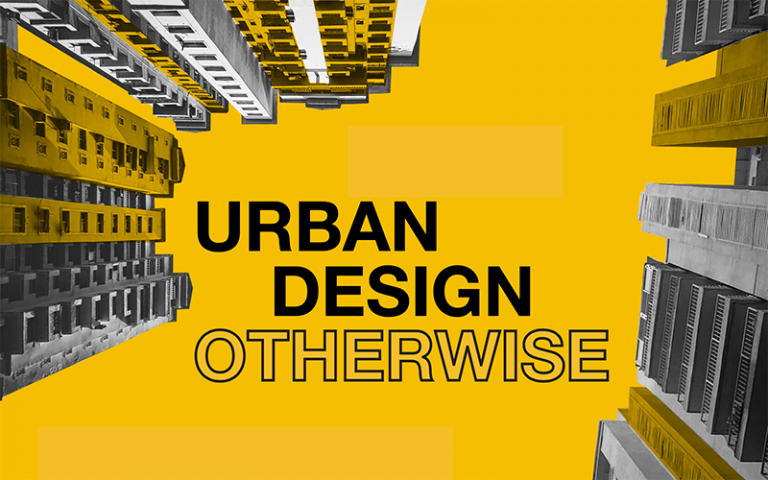Crisis, design and criticality: thinking frictions and ecologies of climate emergency
27 January 2023, 12:30 pm–2:00 pm

Urban Design Otherwise 2023
Event Information
Open to
- All
Organiser
-
Laia García Fernández
Location
-
Virtual event
The impacts of climate change on cities and societies is an important part of current debates on urban issues. These impacts are inevitable, and if society as a whole does not act, the frequency and severity of the impacts will increase. While the commitment to action has a strong focus on technology and individual social behavior, it disregards the fact that the current crisis is the result of both coloniality and modernity that have downplayed the importance of systemic modes of living eroding our relation with the earth and the environment. From most disciplines, design has been at the service of humanity’s exploitation of the environment. At the same time the disintegration of the neoliberal model, a resurgence of right political ideologies, and ongoing environmental emergencies, have shaken every corner of the world. Stability has all but ceased to exist. Crises have displaced bodies in physical space, in social space, in the space of control and limitation of freedom; cities and urban areas have morphed into forms of protection, spaces of immunity across scales, and immobility around secured internal and external borders. As design response, forms of activism, solidarity and resistances are shaping spaces of hope, to support vital endeavors and attempts to imagine possible futures while the protracted crises have no end in sight which would need a constant interrogation on violence, space and the role of design. In this session we will have:
Marina Otero Verzier, Compulsive Desires: On the entangled realities of lithium extraction and the limitless quest for energy
This session analyzes how energy dreams and epistemologies, constructed on cravings for productivity and profit, connect the landscapes of resource extraction, transoceanic fibre optic cables, data centres, automated factories – spaces that epitomize the 'Cartesian enclosure' – and by extension, the technologies, and spaces of everyday life. It addresses how destructive habits of extracting, procuring, and consuming energy follow predictions that assume the inevitability of growth. Estimates that, even in the face of climate catastrophe, render the need for more energy inevitable and rely on finding new fixes rather than embracing other forms of living. Focusing on the cases of lithium extraction in Atacama (Chile) and Covas do Barroso (Portugal), the text addresses the struggles sustained by indigenous and local communities for their lives, sovereignty, and rights. Battles that emphasize how, in what has been described as "green colonialism,” the development of the ‘green energy futures’ comes too often in detriment of those rendered disposable in the name of progress.
Marina Otero Verzier is Head of the Social Design Masters at Design Academy Eindhoven. In 2022 she received the Harvard GSD's Wheelwright Prize for a project on the future of data storage. From 2015 to 2022, she was the Director of Research at Het Nieuwe Instituut, where she led initiatives focused on labor, extraction, and mental health from an architectural and post-anthropocentric perspective. She has co-edited Lithium: States of Exhaustion (2021), More-than-Human (2020), Architecture of Appropriation (2019), Work, Body, Leisure (2018), and After Belonging (2016), among others.
Nada Elfeituri, Rebuilding the Post-Conflict City in the Wake of Global Crises
The city of Benghazi is entering its sixth year of recovery and reconstruction, following a years-long conflict which led to mass displacement, an economic crisis and widespread destruction of the building environment. The reconstruction process has been slow and haphazard, lacking real leadership or a coherent vision of the reconstructed city. This has partially been caused by the wider national political crisis facing the country, which has led to unstable governance and constantly shifting power dynamics.
However, in recent years, it is the impact of international factors which have hindered long-term recovery of the city. The Covid-19 pandemic, the Ukraine-Russia conflict and a looming climate crisis have put pressure on resources and kept the city in a continuous state of emergency. Public officials are attempting to address issues such as the rising cost of living and the effects of extreme weather conditions in a city that still bears the scars of war. This talk will explore the global factors influencing Benghazi today and their effects on its reconstruction. It will look at the tensions fostered between global narratives and local needs, and the role that both state and non-state actors are playing in both mitigating and exacerbating the intersecting crises.
Nada Elfeituri is an architect, urban designer and writer from Benghazi, Libya. She completed her MSc in Building and Urban Design in Development at UCL’s Development Planning Unit on a Chevening Scholarship, where her thesis explored the role played by non-state actors in urban development, in the context of state fragility. Nada work focuses community-led development, urban public policy and post-conflict reconstruction, and has implemented a number of projects in Libya, Myanmar, the United Kingdom and Canada. She has written for publications such as MERIP, Your Middle East and Failed Architecture (forthcoming). She is an executive committee member of the Libyan Institute of Architects and a Public Practice Alumna.
 Close
Close

